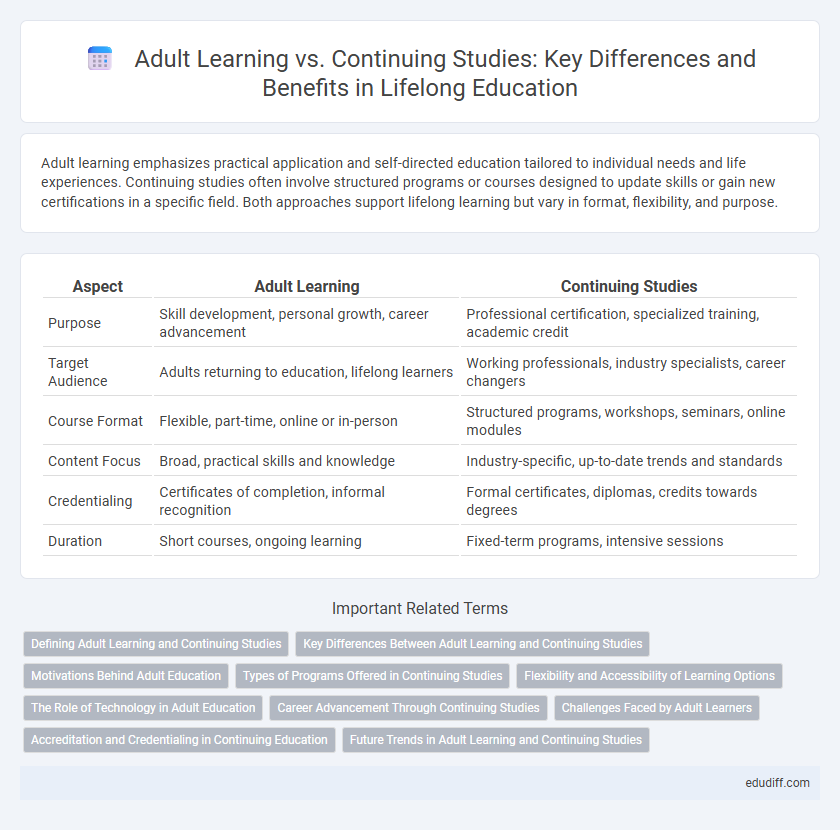Adult learning emphasizes practical application and self-directed education tailored to individual needs and life experiences. Continuing studies often involve structured programs or courses designed to update skills or gain new certifications in a specific field. Both approaches support lifelong learning but vary in format, flexibility, and purpose.
Table of Comparison
| Aspect | Adult Learning | Continuing Studies |
|---|---|---|
| Purpose | Skill development, personal growth, career advancement | Professional certification, specialized training, academic credit |
| Target Audience | Adults returning to education, lifelong learners | Working professionals, industry specialists, career changers |
| Course Format | Flexible, part-time, online or in-person | Structured programs, workshops, seminars, online modules |
| Content Focus | Broad, practical skills and knowledge | Industry-specific, up-to-date trends and standards |
| Credentialing | Certificates of completion, informal recognition | Formal certificates, diplomas, credits towards degrees |
| Duration | Short courses, ongoing learning | Fixed-term programs, intensive sessions |
Defining Adult Learning and Continuing Studies
Adult learning encompasses self-directed, experiential education aimed at personal or professional growth beyond traditional schooling. Continuing studies refer to structured, often credentialed programs designed to update skills or knowledge within a specific field. Both emphasize lifelong education but vary in format, purpose, and learner autonomy.
Key Differences Between Adult Learning and Continuing Studies
Adult Learning emphasizes self-directed education tailored to personal and professional growth, often conducted in informal environments. Continuing Studies typically involves structured courses offered by academic institutions aimed at skill enhancement and credential acquisition. The key differences lie in learning objectives, instructional methods, and target audiences, with Adult Learning focusing on flexibility and lifelong learning principles, while Continuing Studies prioritizes formal accreditation and career advancement.
Motivations Behind Adult Education
Adult learning is often driven by career advancement, skill enhancement, or personal fulfillment, reflecting a strong motivation to adapt to evolving job markets and technological changes. Continuing studies typically attract individuals seeking formal credentials or professional development to maintain certifications and meet industry standards. Both pathways highlight the importance of lifelong learning as a response to changing economic demands and personal growth goals.
Types of Programs Offered in Continuing Studies
Continuing Studies programs offer a diverse range of options including professional development certificates, personal enrichment courses, and industry-specific training tailored to working adults. These programs often feature flexible schedules such as evening classes, weekend workshops, and online modules to accommodate busy lifestyles. Emphasis is placed on practical skills and lifelong learning, enabling learners to advance their careers or explore new interests without committing to full-time enrollment.
Flexibility and Accessibility of Learning Options
Flexibility in adult learning allows learners to tailor schedules around work and personal commitments, enhancing accessibility through online courses, evening classes, and self-paced modules. Continuing studies programs often provide structured timelines and cohort-based learning, which may limit adaptability but ensure consistent progress and peer interaction. Accessibility improvements in adult learning include mobile-friendly platforms and modular content that cater to diverse learning preferences and geographic locations.
The Role of Technology in Adult Education
Technology enhances adult education by providing flexible, accessible learning platforms that accommodate diverse schedules and learning preferences. Online courses, mobile apps, and virtual classrooms facilitate interactive and personalized experiences, increasing engagement and retention rates. Data analytics and AI-driven tools help tailor curricula to individual adult learners' needs, optimizing outcomes in continuing studies programs.
Career Advancement Through Continuing Studies
Continuing studies offer targeted programs designed to enhance career advancement by providing specialized skills and certifications relevant to evolving industry demands. Adult learning emphasizes flexible, practical education tailored to professional growth, often incorporating real-world applications and experiential learning. Earning credentials through continuing studies can significantly improve job prospects, salary potential, and opportunities for leadership roles.
Challenges Faced by Adult Learners
Adult learners face unique challenges such as balancing education with work, family responsibilities, and financial constraints, which can impede consistent study habits and course completion. Limited technological skills and lack of institutional support often create barriers to accessing online learning platforms and resources. Furthermore, adult learners may experience feelings of self-doubt or reduced confidence, impacting motivation and persistence in continuing studies programs.
Accreditation and Credentialing in Continuing Education
Accreditation and credentialing in continuing education ensure that adult learning programs meet established quality standards and provide recognized qualifications. Accredited institutions offer continuing studies with formal certification, enhancing professional credibility and career advancement opportunities. These credentials often align with industry requirements, validating skills and knowledge acquired through ongoing education.
Future Trends in Adult Learning and Continuing Studies
Future trends in adult learning and continuing studies emphasize personalized, technology-driven education tailored to individual career paths and life circumstances. Increasing integration of AI-powered platforms and virtual reality enhances interactive and immersive learning experiences, promoting skill acquisition and lifelong learning. Demand for microcredentials and flexible, modular courses grows as learners seek timely, relevant qualifications aligned with rapidly evolving job markets.
Adult Learning vs Continuing Studies Infographic

 edudiff.com
edudiff.com